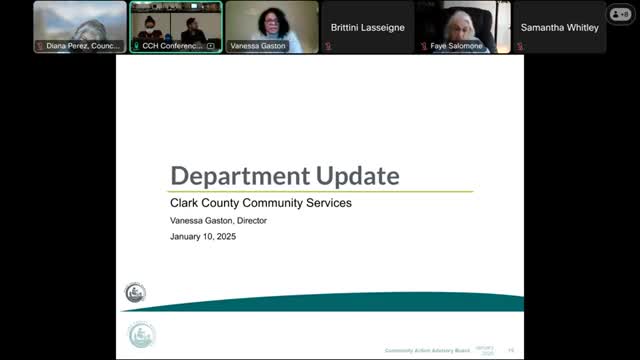Clark County Community Services outlines strategic plan, equity goals and quarterly program outcomes
Get AI-powered insights, summaries, and transcripts
Subscribe
Summary
Clark County Community Services presented a finalized strategic plan, equity statement, department budget overview and Q1 outcomes for Community Action and homeless crisis response programs, highlighting audits, volunteer contributions and next steps for equity-driven contracting and the 5-year homeless plan.
Clark County Community Services staff presented a department-wide update and a finalized strategic plan guiding priorities for the next five years, described equity-driven outreach and contract changes, and reviewed the quarter-one outcomes (July–Sept. 2024) for Community Action and homeless crisis response programs.
Department overview: Vanessa Gasson, director of Clark County Community Services, said the department now manages roughly $73.4 million in annual program funds, operates about 34 full-time-equivalent positions, and administers approximately 126 active provider contracts across 38 funding sources (federal, state and local). She emphasized that the department primarily contracts with external providers — the county delivers large shares of services through partnerships rather than direct service delivery.
Strategic plan and equity: Staff finalized a five-year strategic plan in mid-2024; the plan includes outcomes-focused contracting, data-driven decisions, equity and inclusion goals, provider coordination and youth development. Vanessa and program manager Michael Torres described community listening sessions held in fall 2024 with culturally specific groups (immigrant communities, people with disabilities, people of color and LGBTQ+ participants) and said staff would meet with contracted providers to share feedback and devise ways to improve outreach and culturally confident care.
Quarterly outcomes snapshot (July–Sept. 2024): The department’s Q1 report showed most programs were roughly 25% of annual targets and spending — consistent with a fiscal year that runs July 1–June 30. Highlights included: - Volunteers: 1,438 volunteers contributed about 8,282 hours during the quarter; the estimated value of volunteer hours was $333,599 (value derived from national nonprofit rate tables). - Participant satisfaction: Programs distributed 2,230 satisfaction surveys and received 376 responses (approx. 17% response rate); 91.5% of respondents reported a positive overall experience. - Grievances: Programs logged 63 grievances during the quarter; 58 were resolved as of the report. - Specific program notes: SHARE Hunger Response had expended its allocated funding through the quarter; some providers were revising data collection methods and staff were assisting to improve reporting quality for future quarters.
Why it matters: The strategic plan will guide contracting, scoring of RFA applications and performance measurement. Listening sessions and planned provider coordination aim to reduce access disparities for communities that report barriers to current services.
Next steps: Staff will publish the final strategic plan and translated materials, integrate strategic plan goals into staff performance plans, finalize provider meetings to share listening-session feedback, and complete the five-year local homeless plan by December 2025. The Community Action Board will receive the plan draft and see the equity lens integrated into RFA scoring training scheduled for Jan. 17.
